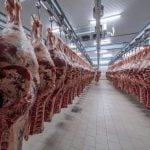Canada and the European Union will need to put in “quite a lot of hard work” to settle several key differences in talks on a proposed free trade deal, a senior official said Thursday.
Canada, keen to diversify its exports away from the United States, opened a ninth round of negotiations with the European Union in Ottawa on Monday on a deal that both sides hope will be ready next year. The talks are due to end Friday.
Officials from both sides said they had made significant progress in many areas but still needed to settle disagreements on issues such as investment protection, intellectual property, access for agricultural goods, and opening up local and national procurement markets.
Read Also

U.S. grains: Corn drops to 12-week low on report of massive stocks, record harvest
Chicago | Reuters – U.S. corn futures plunged on Monday after the U.S. Department of Agriculture reported that U.S. farmers…
“We are optimistic. We are not discounting the difficulties… What is left to do is probably the hardest part but also the most valuable and it will require quite a lot of hard work,” one official told reporters.
“We are not at a stage where we can tell you we have solved 80 per cent of the areas and there is 20 per cent left… we have something relatively important open in most areas of the negotiation… it’s the only way you can do an agreement of this complexity.”
Negotiators from both sides said the differences stemmed in part from a shared determination to lift tariffs and liberalize trade in areas they had not tacked in previous bilateral deals.
Another official said that in most of the areas of contention, just one or two issues remained to be resolved.
For Canada, the pact would be the biggest since it signed the landmark North American Free Trade Agreement with the U.S. and Mexico in 1994. Ottawa says a treaty with Europe would increase two-way trade by 20 per cent.
Canada-EU bilateral trade in goods totaled $77 billion last year, far shy of the Canada-U.S. total of $556 billion. EU officials say the treaty is important, given that the Doha round of trade liberalization talks has stalled.
“Not on offer”
One sticking point is Canada’s insistence on protecting its agricultural sector through a system of supply management, which sets producer quotas and prices on farm commodities such as milk and poultry, and slaps stiff tariffs on imports.
“We are interested in some of the sectors under supply management in Canada. If they’re not on offer at the end of these negotiations, there will be things that are not on offer on our side,” said one official.
Ottawa is keenly aware of critics who complain that opening up the Canadian procurement market could result in too much power being given to foreign firms.
“As we enter the next phase of negotiations, our government will continue to vigorously defend Canadian interests to ensure any agreement we conclude benefits Canadian businesses, workers and their families,” Trade Minister Ed Fast said in a statement Thursday.
Fast says there are particularly promising opportunities for Canadian firms in the giant EU procurement market, worth some $2.4 trillion a year.
Speaking earlier this week, officials said the European side was unhappy with Ottawa’s stance on opening up the procurement market and also wanted to see more progress on allowing foreign investment in the heavily restricted Canadian telecommunications market.















